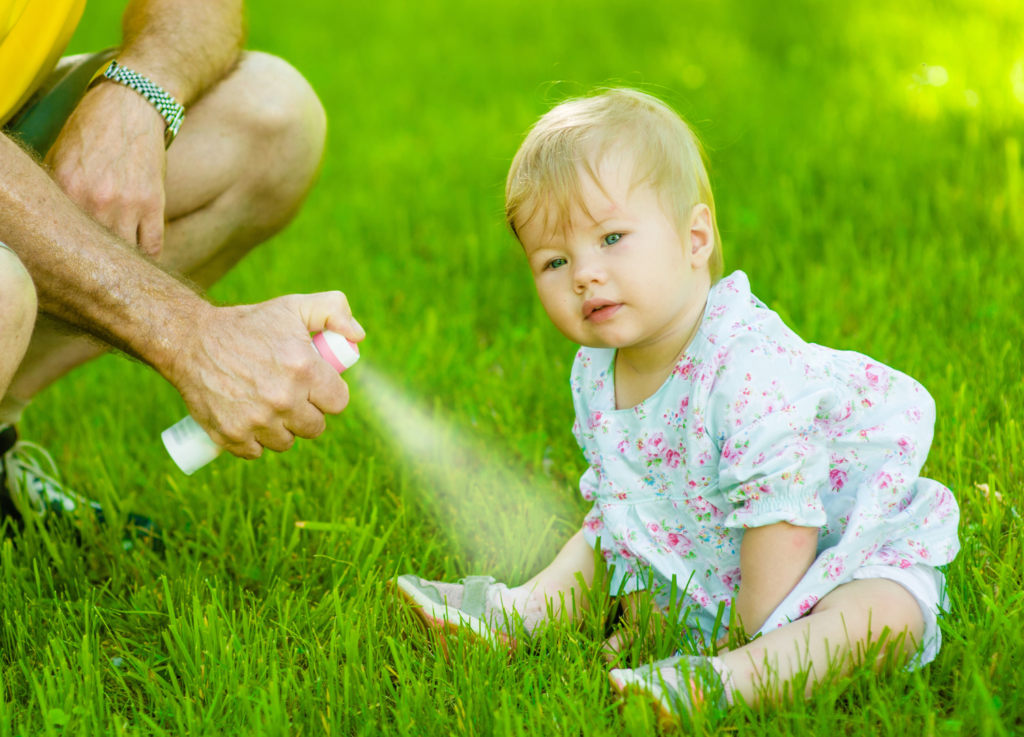Babies & Bug Spray- How To Keep Baby Safe
June 16, 2022 2024-06-20 17:17Babies & Bug Spray- How To Keep Baby Safe
Babies & Bug Spray- How To Keep Baby Safe

Getting outdoors with your family is a wonderful, healthy way to enjoy the warmer seasons. But when we go outside to play, the bugs do too!
We all hate to see our children in pain, especially from bug bites or the potential illnesses they can cause. Keep reading to learn how to best protect your little one from insect bites.
Why Bug Spray Is Important
We all know that many insects can leave bites that irritate the skin, and can be incredibly painful or itchy, especially for babies. Keep in mind that insects can also transmit illnesses like Malaria, Lyme Disease and Zika, to name a few.
Additionally, if your baby has an allergy, their reaction to being bitten by certain types of insects may be immediately dangerous, having the potential to cause severe illness. In some cases, the reaction can be anaphylactic, which causes trouble breathing and can be life threatening.
The best way to protect yourself and your family from bites is to use an effective insect repellent. This can make parents nervous, since most repellents contain harsh sounding chemicals, and we all want to make sure that what we use is safe for babies’ delicate skin and long term health.
**Please note: insect repellants are not to be used on infants under 2 months of age. Mosquito netting and protective clothing is the preferred method for protecting young infants from bites.
What Repellents Are Considered Safe? What Repellents May Be Dangerous?
When it comes to choosing an insect repellent, make sure you are using an Environmental Protection Agency (EPA) registered product. According to the CDC, EPA registered insect repellents are safe and effective for pregnant and breastfeeding women.
DEET: Repellents containing the ingredient DEET are ideal for children. When choosing a product for your child, look for a repellent between 5-30% DEET concentration. The concentration determines the amount of time that it will be effective (For reference, 10% DEET = 2 hours protection, 30% DEET = 5 hours of protection).
If you notice your child developing rashes after using DEET repellents, try a lower concentration and apply more frequently. If rashes still occur, refrain from using and speak to your child’s pediatrician. This reaction is rare, but worth mentioning since using a lower concentration typically resolves the issue.
Oil of Lemon Eucalyptus + Para Menthane-diol: The CDC states that products containing oil of lemon eucalyptus (OLE) or para menthane-diol (PMD) are considered safe and effective for adults, but they are not safe for children under the age of 3. Please note that OLE is not the same as lemon eucalyptus oil (they are not derived from the same plant).
Picaridin: The EPA also states that picaridin is safe and effective as an insect repellent. However, it is not recommended to use on infants less than 6 months in age. It is a relatively new type of insect repellent in the U.S., so more research is needed on the long term effects of Picaridin. This is a good alternative for those with a DEET allergy.
Natural Repellents: “Natural” or botanical repellents are not always what they seem. Citronella, peppermint, lemongrass, soybean and rosemary are common examples of “natural” repellents that often contain plant-based chemicals as well. Not only are these types of products not recommended for infants, but their efficacy is not fully backed by research or the EPA. While we would prefer to use more natural ingredients on our skin, if they are not effective and can potentially be an irritant, it is not worth it.
Click here to visit the EPA’s website and find an insect repellent that works best for you and your family’s needs.
When Can Can You Use Bug Spray On Babies?
According to the American Academy of Pediatrics (AAP), DEET is safe to use on infants over 2 months of age. For newborns, the safest practice is to put them in clothing that covers their arms and legs, as well as brimmed hats. Use strollers/carriers with mosquito netting covers to keep them safe.
How
For babies over 2 months old, there are a few points to remember:
- Use a stick, lotion, or unpressurized spray.
- If using a spray, be sure to use it outdoors to limit inhaling any of the product.
- Always read the product label to see when to reapply.
- Keep repellant off baby’s hands to help avoid ingestion.
- When returning indoors, wash the repellant off your baby’s skin and change their clothes.
What About Natural Repellents?
“Natural” repellents, like citronella, peppermint or soybean oil, are not harmful, but are not EPA approved for effectiveness. They may keep insects away for a short amount of time, but are not suitable in protecting your family, especially in areas where insect borne diseases are a legitimate concern. Additionally, in young children, these products often cause skin irritation.
Can I Use A Combination Bug Spray/Sunscreen?
Applying sunscreen and bug spray at the same time sounds like it would be a convenient decision, especially if you’re planning on spending time by a lake or hiking. However, studies show that sunscreen loses up to 33% of its protection factor when combined with insect repellent. Therefore, you will need to reapply sunscreen more frequently if using both. What is even more concerning is that other studies show that sunscreens increase the absorption of DEET into the skin, which can cause dangerous toxicity in infants and children. Problems tend to arise with misuse or poor application of the products.
If you or your child do need to wear both, be sure to use separate products rather than a 2-in-1. Apply sunscreen 30 minutes prior to insect repellent, and do not reapply the products at the same time. Be sure to follow the instructions on both labels. Sunscreen often needs to be reapplied every 2 hours (or more frequently if sweating or swimming), whereas insect repellents may be up to every 6 hours. Using a combination product would only result in an unnecessary, and potentially harmful amount of DEET toxins on your infant’s delicate skin!
To learn more about sun safety for infants, read our article here.
It is inevitable that even with your best efforts, your baby will get a bug bite at some point. Don’t feel guilty, it happens! To learn more about bug bite treatment and relief, read our article here.
Stay safe!
References:
https://www.healthychildren.org/English/safety-prevention/at-play/Pages/Insect-Repellents.aspx
https://www.cdc.gov/ncezid/dvbd/about/prevent-bites.html
https://www.epa.gov/insect-repellents/find-repellent-right-you
https://caringforkids.cps.ca/handouts/safety-and-injury-prevention/insect_repellents
***The information provided on our website is intended solely for general educational and informational purposes only. It is neither intended nor implied to be a substitute for professional medical advice. Always seek the advice of your physician for any questions you may have regarding your or your child’s medical condition. Never disregard professional medical advice or delay in seeking it because of something you have received in this information.***
Search
baby bottle feeding breastfeeding breastfeeding latch breastfeeding pain breast milk storage breast refusal bugs cedar park regional clogged duct contraceptives daycare discharge doula engorgement exercise foremilk galactogogues hindmilk hospital how to latch baby labor low milk supply low supply massage mastitis newborn care nursing strike nutrition pacifiers plugged duct plugged ducts postpartum prenatal pumping relactation siblings sleep sore nipples breastfeeding suck training tax breaks thrush tongue tie video weaning
Search



